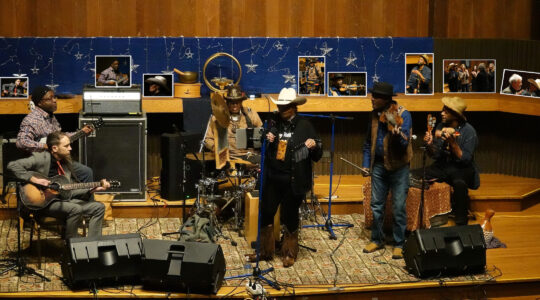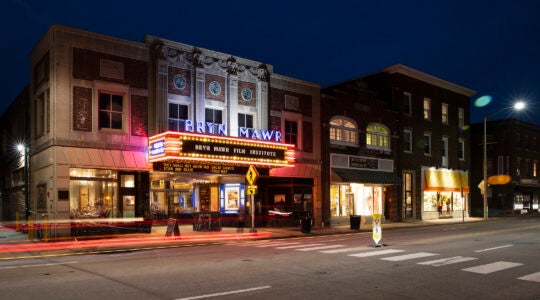Two different writers take the temperature of the yeshiva attacked last week – and offer different takes on the state of its founder’s vision of a partnership between secular and religious Zionists.
Writing in the New York Sun, Hillel Halkin looks back at the founder of the yeshiva attacked last week, and concludes that his groundbreaking vision of a partnership between secular and religious Zionists is coming undone:
What [Palestine’s first chief rabbi, Abraham Isaac Hacohen Kook] did was to provide a powerful intellectual justification for religious Jews to cooperate fully with a secular Zionist establishment — and when this establishment created, after his death, a secular Jewish state, to regard the latter and its institutions as part of a divine plan for Redemption that it was a religious commandment to support and take part in.
As taught at the Merkaz Ha-Rav Yeshiva and the many emulations of it that sprang up, this became the accepted outlook of what is known as Israel’s “national religious community,” which today comprises some half-million Jews or one-tenth of Israel’s Jewish population. And when, after the 1967 war, the territories occupied by Israel in the biblical heartland of Judea and Samaria became available for Jewish settlement, it was also this outlook that impelled Gush Emunim to co-opt as much of the Israeli state’s power as it could in order to settle Jews in these areas. The fusion of state power with religious idealism seemed perfectly legitimate from its point of view.
But what the leaders of the religious settlement movement failed to realize at the time was that the same state power that could be put to use by them had a will of its own that also could turn against them. This was what happened in the disengagement from Gaza in 2006, bitterly opposed by the “national religious” community, and it is what is threatening to happen on a much larger scale in the West Bank.
Today, this community, particularly its youth, feels betrayed and abandoned by the secular state it once championed, and increasingly alienated from it.
The murder of the eight students at the Merkaz Ha-Rav Yeshiva cannot, of course, be directly blamed on Israel’s secular government; if anything, the yeshiva itself was negligent in not posting guards and taking sensible precautions.
But the “national religious” community’s enraged feeling that it alone today in Israel is fully committed to the war against Palestinian terror, in which its government is at best half-heartedly engaging while continuing to pursue the mirage of peace negotiations with the Palestinian Authority, will only be strengthened.
The Kookian vision, which (however far it may have strayed from Kook’s original intentions) has served as this community’s guiding light for 80 years, is now foundering and close to collapse. Needless to say, the Palestinian gunman who chose the Merkaz Ha-Rav as his target was unlikely to have been aware of all this. He did not know the half of what he was shooting at.
Nadav Shragai, in Ha’aretz, is more hopeful:
“The worst Israeli government is immeasurably better than the best diaspora. Ever since the establishment of the state, we have rejoiced in it despite its flaws.” That is what Rabbi Haim Druckman, head of the Bnei Akiva religious youth movement, has been saying over and over again since the uprooting of the Gaza settlements.
Druckman is sticking to his support for the state even now, as the minister of education is being ejected from the grieving Mercaz Harav Yeshiva. …
In such remarks, Druckman expresses the pro-state religious outlook that Mercaz Harav symbolized for decades, and to which its rabbis still adhere even after last week’s deadly terror attack. …
“This incident,” [rabbi and educator Benny Lau] believes, “is bringing many back to the main path – to national responsibility, to a partnership with all Jews. And it likely to unite various strains that seem as though they had diverged. This is the spirit of mission and devotion to national goals, from within an outlook of Torah and faith. And it is still very dominant.” …
As though to reinforce Rabbi Lau’s impression, students at Mercaz Harav have been hearing the following from their rabbis in recent days: “We make a clear and absolute distinction between the current government, which is temporary and ephemeral, and the state and our renewed sovereignty in the land of Israel. The state of Israel is a positive commandment from the Torah. The first step in settling the land is not to leave it in the hands of another people, in the hands of another regime, and this element cannot be realized except by Jewish rule – regardless of whether it is Solomon or Jeroboam. The main thing is Jewish rule … Today, we have been stricken by a great disaster, and with all due understanding of the feelings of wrath and anger at the shortcomings and the terrible mistakes that led to this disaster, we are continuing in the path of Torah and faith as part of the Jewish people in the state of Israel, facing the public, and not with our backs to it.”
This pro-state line is not easy for everyone at Mercaz Harav, and especially not for the young people, many of whom were in Amona and Gush Katif. But at least the rabbis are making it clear that even after the great disaster, their line will not change.





